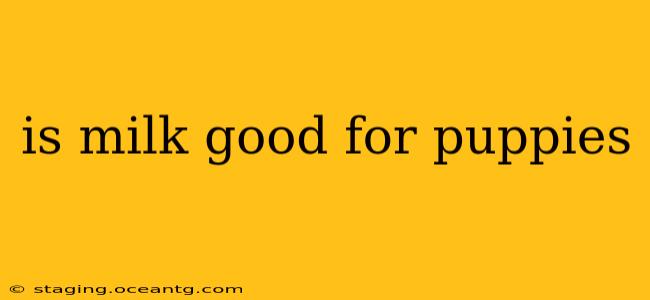The question of whether milk is good for puppies is a common one among new pet owners. The short answer is: it's complicated. While the image of a puppy lapping up a bowl of milk is charming, the reality is more nuanced. Many puppies, especially those under 6 months old, lack the enzyme lactase needed to properly digest cow's milk. This can lead to digestive upset, including diarrhea, vomiting, and gas. Let's delve deeper into this topic.
What Happens When Puppies Drink Cow's Milk?
Cow's milk is formulated for calves, not puppies. It has a different composition of fats, proteins, and lactose compared to a puppy's natural source of nutrition – mother's milk. For puppies lacking sufficient lactase, the lactose in cow's milk remains undigested, fermenting in the intestines and causing various gastrointestinal problems. These problems can range from mild discomfort to severe dehydration, requiring veterinary intervention.
Can Puppies Drink Any Type of Milk?
While cow's milk isn't ideal, other types of milk aren't necessarily better options either. Goat's milk, sometimes suggested as a gentler alternative, can also cause digestive issues in puppies, although it may be slightly better tolerated than cow's milk due to its slightly different composition. Soy milk, almond milk, and other plant-based milks are not suitable substitutes for mother's milk or puppy formula. These lack the essential nutrients a growing puppy needs.
What Should I Feed My Puppy Instead of Milk?
The best source of nutrition for a puppy is its mother's milk, especially in the first few weeks of life. If the mother is unavailable or unable to nurse, puppy milk replacer (also called puppy formula) is the recommended alternative. These formulas are specifically designed to meet the nutritional requirements of young puppies and are readily available at pet stores and veterinary clinics. Always consult with your veterinarian to choose the right formula for your puppy's age and breed.
When Can Puppies Drink Cow's Milk? (If At All)
Some older puppies, beyond the weaning stage (typically around 8 weeks), might tolerate small amounts of cow's milk without significant issues. However, this is not guaranteed. Even then, it's generally not recommended as cow's milk doesn't offer the nutritional benefits a puppy needs for healthy growth. If you're considering introducing cow's milk, do so very gradually and in tiny quantities, monitoring your puppy closely for any signs of digestive distress. If you notice any problems, discontinue immediately.
What are the Signs of Milk Intolerance in Puppies?
Recognizing the signs of milk intolerance in puppies is crucial for their health and well-being. These signs can include:
- Diarrhea: This is a common symptom of lactose intolerance, often watery and frequent.
- Vomiting: Puppies might vomit undigested milk or food.
- Gas and Bloating: Excessive gas and abdominal distension can indicate digestive discomfort.
- Lethargy: A puppy experiencing digestive issues may be less playful and more tired.
Is it safe to give my puppy lactose-free milk?
While lactose-free milk might seem like a solution, it's still not ideal for puppies. Although it lacks lactose, it still doesn't contain the complete nutritional profile a puppy requires for optimal growth and development. Sticking to puppy formula or mother's milk is always the best choice.
My puppy loves milk, is it okay to give it as a treat?
No, even if your puppy seems to enjoy milk, it's not a suitable treat. The potential risks outweigh any perceived benefits. Offer your puppy age-appropriate treats specifically formulated for their nutritional needs.
In conclusion, while the image of a puppy drinking milk might seem endearing, it's essential to prioritize their health and well-being. Providing puppy formula or mother's milk is crucial for their development. Cow's milk and other alternatives pose potential health risks and should generally be avoided. Always consult your veterinarian for personalized dietary advice for your puppy.
